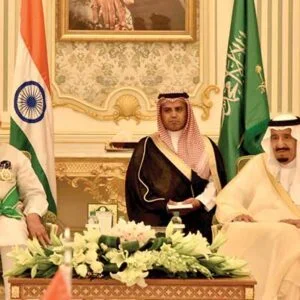India’s defense and security relations with the Gulf countries, especially Saudi Arabia and the United Arab Emirates (UAE), have flourished in recent years. Bilateral cooperation in maritime securityand counter-terrorism, and military-to-military ties have strengthened due to persistent diplomatic outreach and security calculations in New Delhi, Abu Dhabi and Riyadh. High level exchange of visits by political and military leadership has created greater understanding and appreciation of each other’s threat perceptions. This has led to an emphasis on expanding defense cooperation to newer areas such as joint exercises, training of defense personnel, research and exploration and defense manufacturing and acquisition.
A key component ofdiscussion on defense cooperation is the potentials for collaborative efforts to promote indigenous defense industries in India, Saudi Arabia and the UAE to reduce their external reliance for defense acquisition. Among the Memorandums of Understanding (MoUs) signed during the visit of Prime Minister Narendra Modi to Saudi Arabia in October 2019was between Saudi Arabia’s General Authority of Military Industries (GAMI) and the Department of Defense Production in the Indian Ministry of Defence (MoD). The MoU envisaged “collaboration in military acquisition, industries, research, development and technology.” Similarly, anMoU on cooperation in the field of defense industry was signed between Indian and Emirati defense ministries during the visit of Abu Dhabi’s Crown Prince Mohammed Bin Zayed to New Delhi in January 2017.
Indigenous defense industries in UAE and Saudi Arabia
Given the geopolitical climate in the Gulf and West Asia, the regional countries face serious security challenges. There are several geopolitical and economic factors that have forced Arab Gulf monarchies to look for diversification of their defense procurement while simultaneously focusing on developing a local defense industry. For one, there are security threats due to tensions with Iran, the rise of non-state actors such as Houthi rebels in Yemen andthreats from jihadi-terrorist organizations such as Islamic State (ISIS) and Al-Qaeda. On the other hand, their most reliable security partner, the United States (US) on which they had depended for their security for long, is keen on reducing its regional commitments to focus on the Indo-Pacific to contain a rising China.
Saudi Arabia and the UAE are among the top defense importers in the West Asiacausing a significant burden on their exchequer. According to the Stockholm International Peace Research Institute (SIPRI) during the 2016-20 period, Saudi Arabia’s defense purchases rose by 61 percent. The UAE has been in talks with the US to acquire F-35 fighter jets and armed drones that would cost billions of dollars. From an economic point of view, establishing a defense industrial base will not only reduce external reliance but ease the burden on the exchequer. It will also help in the economic diversification efforts away from the oil-driven economy and also create the much-needed local employment.

Accordingly, the UAE and Saudi Arabia are ramping up efforts to develop indigenous defense industry. The UAE is a pioneer in this field in the Gulf region and is emerging as a regional hub for defense manufacturers. The first step in this direction was the formation of the Emirates Defense Industries Company (EDIC) in 2014 by integrating 16 smaller defense manufacturing companies. This was followed up with further consolidation of 25 smaller defense companies with the launch of EDGE in November 2019. With an estimated consolidated revenue of US$5 billion and 12,000 employees, the EDGE has emerged as one of the largest defense companies in the region.
With a focus on acquisition of technology, innovation and research, the company is expecting to become a provider of cutting-edge solution for the future warfare. Faisal Al Bannai, CEO and managing director of the conglomerate said at the time of its launch,“The solution to address hybrid warfare lies at the convergence of innovations from the commercial world and the military industry. Established with a core mandate to disrupt an antiquated military industry generally stifled by red tape, EDGE is set to bring products to market faster and at more cost-effective price points.”
The UAE is also focusing on bringing more international partners to shore up its local defense industry. A key aspect of this is the biennial organization of defense exhibitions to display the evolution of the local industry and attract international partners. The International Defense Exhibition (IDEX) and the Naval Defense Exhibition (NAVDEX) in Abu Dhabi, the 15th edition of which were held on February 21-25, have emerged asmajor regional attraction in this sector. According to Abu Dhabi Exhibition Company (ADNEC), the organizer of the IDEX and NAVDEX 2021, the expo witnessed participation of 900 exhibitors from 59 countries and deals worth US$5.7 billion were signed by the UAE armed forces during the event.
Independent reports from think tanks and industry observers underline the prospects of growth in the local defense industry in the UAE as well as the efforts made by the Saudi monarchy in this direction. In 2017, Saudi Arabia floated two companies to work on enhancing the prospects for local defense production. The Saudi Arabian Military Industries (SAMI) was inaugurated in May while the General Authority for Military Industries (GAMI) was launched in August last year. While the SAMI aims to become one of the top regional defense production companies, the GAMI is a regulatory body that aims to promote local industries and reduce import dependence of the kingdom “by developing industries, facilitating research and technologies, developing national human capital.” Simultaneously, it wishes to “enhancing exports through enabling the sector by long-term planning of military purchases and providing incentives to local manufacturers.”
Needless to say, that the two regional power house are ahead in comparison to other Gulf competitors both in terms of the intent and capacity to invest in developing local defense industries and reduce the external dependence.

Emphasis in India on defense industry
India too faces serious internal and external security challenges. It has been working towardsmodernisation of its armed forces to meet the challenges of future warfare. The evolving hybrid nature of warfare is leading to a shift of focus in the armed forces from a personnel-driven to a technology-driven approach. But due to a lack of local defense industry and production, currently India overwhelmingly depends on imports to fulfill the requirements of its forces.This has led to India being among the top defense importers in the world. According to SIPRI, during the 2016-20 period, India was the second largest defense importer in the world after Saudi Arabia, though its overall imports fell by nearly 32 percent, in comparison to the 2011-15 period.
Recognizing the changing nature of warfare and the need for reducing the import-dependence, the Government of India (GoI) has been focusing on promoting local defense industry. Both the Make in India and Atmanirbhar Bharat initiatives include this objective with the larger aim of increasing the proportion of made in India weapons and equipment in acquisition and procurement for the armed forces. Eventually, India wishes to enhance its defense exports wherein it currently ranks 23rd among top 25 defense exporting countries.
There are two basic aspects that are important in this regard; one is capacity-building in defense production and second is the need for acquiring cutting-edge technology. Both require international partnerships in addition to local efforts toward capacity building, research and innovation. There are some movement in this direction and the MoD is focusing on acquisition of home-grown equipment and weapons for the armed forces.
During 2018-20, the GoIhas “accorded Acceptance of Necessity (AoN) to 112 Defence proposals, worth Rs 1,99,860 crore [US$275.62 billion] approximately, under the various categories of Capital Acquisition” to promote domestic manufacturing. Accordingly, “Many significant projects including 155mm Artillery Gun system ‘Dhanush’, Bridge Laying Tank, Thermal Imaging Sight Mark-II for T-72 tank, Light Combat Aircraft (LCA) ‘Tejas’, ‘Akash’ Surface to Air Missile system, Submarine ‘INS Kalvari’, ‘INS Chennai’, Anti-Submarine Warfare Corvette (ASWC), Arjun Armoured Repair and Recovery Vehicle, Landing Craft Utility (LCU) etc. have been produced in the country under ‘Make in India’ initiative.”
Common grounds
As noted in the introduction, India’s defense and security ties with the UAE and Saudi Arabia have strengthened significantly in the recent years. In addition to other areas, there is a greater intent for collaboration in the field of defense industry. India has signed MoUs with both the UAE and Saudi Arabia for cooperation in this sector. The MoU signed with the UAE envisages greater cooperation in the “fields of defense manufacturing and technology, including through studies, research, development, innovation and cooperation between public and private sector institutions.” It furthers provisions forpartnerships in “areas of armaments, defense industries and transfer of technology.”
India, UAE and Saudi Arabia intend to develop indigenous defense industries, share strong security ties and have evolved mechanisms for cooperation among their armed forces. Within this framework, the need is greater contacts and discussions among industry leaders and experts to transform the intent into a reality. There are immense possibilities given that India has many advantages such as expertise in cyber security and its large pool of trained personnel ready to be channelized. Joint ventures between industry leaders can boost capacity-building and local production. In addition to bilateral collaboration, given the strong relations between the three countries trilateral joint ventures can be explored.

Besides, there are possibilities for collaboration in research and development, especially in niche areas of artificial intelligence, cyber security, electronic surveillance, space exploration etc. wherein India can offer its expertise while the UAE and Saudi Arabia can invest capital. The defense exhibitions, such as DefExpo and AeroIndia and IDEX and NAVDEX, offer the platforms for explore collaborative opportunities.
Conclusion
The defense industries in India, UAE and Saudi Arabia are at various stages of development. India has an advantage because of its large market and huge pool of human resource as well as a well-established manufacturing ecosystem and research institutions working in niche areas. The UAE with its concentrated efforts and track record of successful transformation in other economic sectors is emerging as the leading defense industrial hub in the Gulf and West Asia. It also has immense potentials in terms of the ability in technology acquisition and capital infusion. Likewise, Saudi Arabia as a regional giant has advantages in terms of capital infusion and technology acquisition. Its nascent defense industry is in need of fast growth.
The governments in all three countries have put an emphasis on the need to reduce external dependence for defense acquisition, and are taking steps to push for self-reliance in defense manufacturing. The excellent relations and existing agreements on collaboration in this field provide the template for collaborative efforts. Industry leaders in the three countries need to take initiatives and tap this hitherto underdeveloped area which is vital national security and has both economic and geopolitical implications.
–The writer is Associate Fellow, Manohar Parrikar Institute for Defence Studies and Analyses (MP-IDSA), New Delhi. Views expressed are of the writer and do not necessarily reflect the views of MP-IDSA or Government of India









